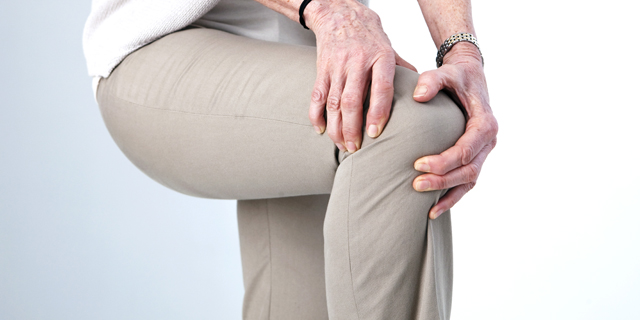Knee replacement surgery – what you need to know

Knee replacement is the most common type of surgery used to treat knee arthritis, with 98,591 first time knee replacements recorded in 2015 in UK acording to the National Joint Registry.
In this article, Mr Sanjay Sinha, Consultant Orthopaedic Surgeon at The Holly Private Hospital, answers your frequently asked questions about knee replacement surgery.
When should I talk to my doctor about knee replacement surgery?
You should talk to your doctor about knee replacement surgery if your knee arthritis is causing you significant pain, stiffness and interfering with your sleep, daily activities and quality of life, despite taking regular pain killers.
How do I get a diagnosis that I need a knee replacement?
Your doctor will make the diagnosis by asking you questions about your symptoms and by examining your knee. We will perform radiographs of your knee to confirm the diagnosis and severity of knee arthritis.
What signs would indicate that I might a knee replacement?
You may need a knee replacement if your radiograph confirms the diagnosis of advanced arthritis with your knee is worn to the extent that your mobility is reduced and you experience significant knee pain despite having tried non-operative treatment such as painkillers, physiotherapy and walking aids.
How common are knee replacements?
Knee replacement is a common type of surgery with a total of 104,695 procedures reported to National Joint Registry in 2015 in UK. Of these 98,591 were first time (primary) knee replacements www.njrcentre.org.uk
What does a knee replacement surgery involve?
Knee replacement surgery involves removing the damaged cartilage and bone from your knee joint and replacing it with an artificial knee joint. It’s performed either under general anaesthetic (where you are asleep throughout the surgery) or under spinal/epidural anaesthesia (you’re awake, but have no feeling from the waist down). An incision is made over knee to expose the knee joint, then the damaged end of your femur (thigh bone) and tibia (shin bone) are carefully removed and cut. Both ends are precisely measured and fitted with an artificial joint (prosthesis) mostly using bone cement.
How big will the scar be?
The size of the incision can vary and depends on several factors like size of the patient, the complexity of the surgery and surgeon preference. Most studies have shown that smaller incision offer no improvement in pain or recovery.
How long does it take to do the surgery and how long will I be in hospital?
The surgery usually takes around 1.5 to 2 hours on average. Patients are usually admitted to hospital on the day of the surgery and stay in hospital between two to three days afterwards.
What other treatments might be considered before knee replacement?
The other treatments that may be considered before knee replacement include painkillers , physiotherapy, walking aids and brace. Local anaesthetics with steroid injection are sometime injected to knee as a temporary measure for pain relief and occasionally as to confirm the diagnosis and source of pain when it’s not clear from scans. If you are overweight, losing weight may help reduce your symptoms.
What are knee replacements made from and how long do they last?
Knee replacement implants are made of metal alloys of cobalt chrome on femur side and titanium on tibia side. The bearing portion of joint is made of high grade, wear resistant polyethylene (medical grade plastic) which is commonly fixed to titanium part of implant.
Knee replacements are expected to last for 15 – 20 years. A more accurate way to think about longevity is via the annual failure rate which is between 0.5 – 1.0% meaning that if you have your knee replaced today, you have a 90-95% chance that your joint will last 10 years and a 80% – 85% that it will last 20 years. With improvement in technology, these numbers may improve.
Are there any risks with having a knee replacement?
The risks associated with knee replacement surgery in general include infection, bleeding, nerve or vessel injury, blood clot / deep vein thrombosis & pulmonary embolism.
Specific risks associated with knee replacement include fracture, stiffness, numbness in the area around the scar, persistent knee pain, instability, loosening and wear of the prosthesis. Further surgery may be needed if any of these complications occur.
Your consultant will discuss with you and risks before you have surgery.
What benefits can I expect to gain through having knee replacement surgery?
A new knee joint should- relieve pain, improve your mobility and quality of life. Research has shown that four out of five patients who’ve have had knee replacement are happy with their new knee. Your consultant will talk through all of this with you before you agree for operation so you are fully aware of how a new knee joint may help you.
How soon will I be able to resume normal activities?
Our nursing staff and physiotherapist will help you to get up and walk about as quickly as possible after surgery. If you are on enhanced recovery programme , you may be able to walk on the same day as surgery. Generally you will be helped to stand within 12-24 hrs after your operation.
After your surgery, you will be seen by our physiotherapist who will follow a rehabilitation programme and teach you exercises to strengthen your knee. Generally you should be able to walk without crutches within four to six weeks and feel more or less normal after three months. It can take up to a year for any knee/leg swelling to settle.
When can I drive again?
You can resume driving once you are able to bend your knee enough to get in and out of car and able to control the car properly. Some literature states that your reaction time will not be back to normal prior to six weeks after surgery.
Can I play golf after my knee replacement?
You can generally resume playing golf about 18 weeks after your knee replacement. Right handed golfers with left knee replacement need to use extra caution as their lead leg will take on greater rotational forces while swinging their club.
Will my implant set off metal detectors at airports?
Usually patients with knee replacements will set off metal detectors. You do not need to carry any specific documentation to prove that you have a joint replacement.
An initial consultation with Mr Sinha costs £200 – £250 if you don’t have health insurance.
A package price for a knee replacement operation starts from £10,150 (includes initial consultation).
To book a consultation, call our friendly appointments team on 020 8936 1201.
For more information on self-pay pricing just call our friendly Self-Pay Team on 020 8936 1157 or email info@theholly.com
Date: 15/05/2017

